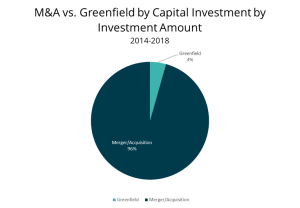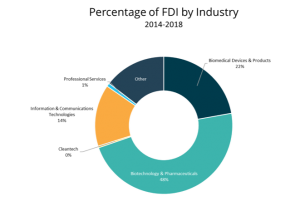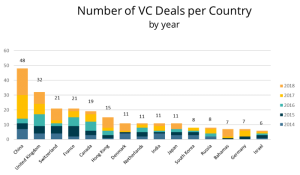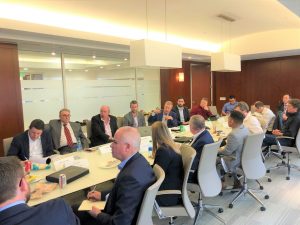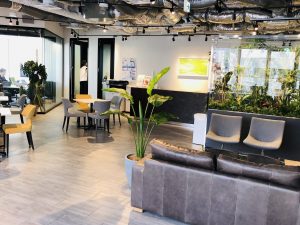World Trade Center San Diego’s Flagship Export Program
San Diego – San Diego Mayor Kevin L. Faulconer and World Trade Center (WTC) San Diego unveiled the 15 companies selected to participate in MetroConnect V, the fifth iteration of WTC San Diego’s international sales accelerator program, underwritten by Procopio and JPMorgan Chase & Co. The program is designed to help local companies jump start and scale their global growth.
“One of San Diego’s biggest exports is the innovation and ingenuity of our local companies and this business accelerator helps fuel the entrepreneurs of tomorrow,” Mayor Faulconer said. “Programs like MetroConnect strengthen our local economy by creating opportunities for our small businesses to build greater networks, employ more San Diegans and further invest in our region.”
Now in its fifth program-year, WTC San Diego has adapted MetroConnect V to address the unique circumstances brought on by COVID-19. Routine video conferencing, an enhanced export education program, and virtual workshops with program partners are among the changes implemented prior to the virtual launch. MetroConnect continues to equip small and medium-sized companies (SMEs) with a suite of financial and programmatic resources in their efforts to bring their products and services to global markets.
Meet the Companies
1. Amavara
2. Blue Sky Network, LLC
3. Dynam.AI
4. Forward Slope, Inc.
5. LunaPBC
6. Mayan Robotics, LLC.
7. Modern Times Drinks
8. MRIaudio, Inc.
9. Omni2Max, Inc.
10. Semantic AI
11. Sidus Solutions
12. TradeSun, Inc.
13. Trex Enterprises Corp.
14. Uprise Energy
15. White Labs, Inc.
More About the Program
The MetroConnect program is highly competitive, with just 15 companies selected based on a variety of criteria, including product potential, interest in new markets, assessed impact of program funds and resources, current international traction, and more. Applicant companies are assessed by a panel of judges, which include representatives from Qualcomm Ventures, Connect w/ San Diego Venture Group, Biocom, the U.S. Commercial Service, CMTC, Viasat, Mitsubishi Electric, Procopio, San Diego State University, Tech San Diego, UC San Diego, San Diego Regional EDC, WTC San Diego, and the previous year’s program winner.
The MetroConnect program resources include:
- $5,000 in matching grants to cover the costs associated with international expansion, made possible by co-underwriters JPMorgan Chase and Procopio, and with additional funds and in–kind services from more than a dozen sponsor companies
- One year of complimentary access to SYSTRAN’s premium enterprise machine translation platform
- Workshops (7) addressing export compliance, localized marketing strategies, and more, taught by private sector experts from the San Diego business community
- Dedicated WTC San Diego staff manager to support company participants in deploying overseas strategies during the grant period
- Reduced airfare on international flights out of San Diego International Airport with American Airlines, British Airways, and Japan Airlines
- Free consultations with legal, tax, and consulting partners
- Access to a mentor network consisting of trade experts at large and mid-sized San Diego firms and country representatives at the Japan External Trade Organization and the United Kingdom Government Office in San Diego
- Consideration to compete for an additional $25,000 during the MetroConnect Grand Prize Pitchfest
“San Diego’s continued economic growth is vital to the region’s long-term health and prosperity,” said Aaron Ryan, Executive Director and San Diego Region Manager of JPMorgan Chase’s Middle Market Banking & Specialized Industries practice. “MetroConnect will enable some of San Diego’s brightest companies to grow internationally, and help them successfully navigate the complexities of doing business abroad. JPMorgan Chase is proud to support this impact on the San Diego economy.”
Since the program’s debut in 2015, 65 MetroConnect alumni have collectively generated $85 million in new export sales, signed 500 new contracts, added 269 new jobs to the region, set up 18 new overseas facilities and seen five successful company exits. Past participants include Coronado Brewing, Cypher Genomics (acquired by Human Longevity Inc.), Dr. Bronner’s, Planck Aerosystems, Scientist.com and many more. From community-owned health and genomic data platform LunaPBC, to unmanned aerial systems component manufacturer Mayan Robotics, to California’s very first employee-owned brewery Modern Times, the 2020 MetroConnect companies represent a diverse cross section of San Diego’s innovation economy.
“The MetroConnect program’s support of innovative, high-growth SMEs aligns with the priorities of our firm,” said Jim Perkins, COO and Chief Compliance Officer of program co-underwriter Procopio. “We are thrilled to support WTC San Diego in this endeavor and are looking forward to lending our knowledge and expertise to the new cohort of MetroConnect companies.”
Why MetroConnect Matters Now More Than Ever
Expanding a customer base into multiple markets creates resiliency. That has been especially true during the COVID-19 pandemic as global markets have been affected, then subsequently recovered at varying rates. Additionally, as a port city, trade has always played a big role in San Diego’s economy and the success of the businesses that call this city home. In 2018 alone, San Diego exported more than $20 billion in goods overseas, as well as billions more in services like software, cybersecurity, engineering and research. SMEs produce 92 percent of those goods – driving home the point of programs like MetroConnect. Plus, according to the Brookings Institution, companies that are global pay higher wages, are less likely to go out of business, and increase productivity of the domestic market.
One member of the current cohort has already experienced the benefits of taking part in a program like MetroConnect. White Labs’ yeast serves as a key ingredient in beer, which has made it a pillar of San Diego’s craft brewing industry for the last 25 years. International expansion has always been an important part of White Labs’ business, and it applied to be part of the MetroConnect V cohort to expand and improve its international procedures, policies, and marketing to continue to expand globally.
MetroConnect put White Labs in contact with JAS Forwarding. JAS was able to assist White Labs by reviewing its import/export procedures. This consultancy resulted in White Labs adapting their documentation systems to decrease customs clearance holds in Australia.
JoAnne Carilli-Stevenson, Head of Business Development for White Labs, told the MetroConnect team that this change has “resulted in improved service to customers, and decreased re-shipments required due to custom delays. At a time when we are working hard to balance supply and demand during crisis, this change in international procedure is significant for us.”
“Amidst a global health and economic crisis, new agreements and ongoing negotiations with key trading partners, and the rapid evolution of global supply chains, it is more important than ever to give local SMEs an edge in the global marketplace by equipping them with the tools to be successful,” said Nikia Clarke, executive director of World Trade Center San Diego. “Financial assistance, export education, preferred access to ancillary export services, and connectivity to an international network of partners and mentors – all of these were requests emanating from the small and medium-sized companies this program serves. With 98 percent of San Diego’s economy comprised of such businesses, it is critical that we are responsive to their needs.”
See the full list of MetroConnect V companies here.
About World Trade Center San Diego
World Trade Center San Diego operates as an affiliate of San Diego Regional Economic Development Corporation. WTC San Diego works to further San Diego’s global competitiveness by building an export pipeline, attracting and retaining foreign investment and increasing San Diego’s global profile abroad. sandiegobusiness.org/wtcsd
###
